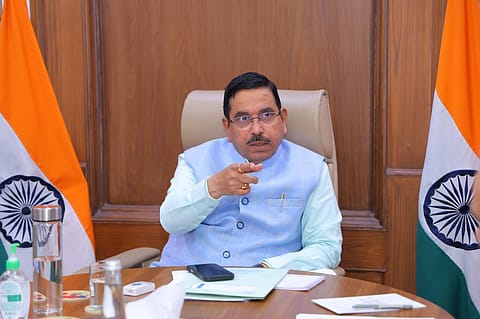India targets swadeshi solar cells by 2028, eyes indigenous wafers, ingots: Pralhad Joshi
The minister highlighted that India’s 2030 vision of achieving 500 gigawatts of non-fossil capacity is already more than halfway accomplished—with the country crossing 251.5 GW of non-fossil capacity.

India is firmly moving towards building an end-to-end swadeshi (indigenous) solar value chain, with the aim of indigenously manufacturing solar cells by 2028, Pralhad Joshi, the Union Minister of New and Renewable Energy, said at the State Review Meeting on Renewable Energy organised by the ministry.
“The country is now advancing beyond modules to develop domestic capacity for wafers and ingots as well, ensuring that the entire solar manufacturing ecosystem is established within India. This step will not only reduce import dependence but also generate employment, boost investment, and strengthen India’s position as a global leader in clean energy manufacturing,” the minister was quoted as saying by a press release issued by the ministry.
The minister highlighted that India’s 2030 vision of achieving 500 gigawatts of non-fossil capacity is already more than halfway accomplished—with the country crossing 251.5 GW of non-fossil capacity. “This achievement is a testament to the visionary leadership of Prime Minister Narendra Modi, which transformed India’s clean energy growth and domestic manufacturing in the renewable energy sector, and is accelerating the march towards Viksit Bharat,” he said.
Joshi also underscored that India has accomplished a critical milestone of 50% of installed electricity capacity from non-fossil fuel sources five years ahead of schedule. He, however, caveated that capacity addition must also be complemented by effective utilisation, and exhorted states to expedite Renewable Purchase Obligations, power purchase agreements, and land allotments, while ensuring transparency at the same time. “Timely action is the backbone of this system. If we keep delaying procurement on the expectation that tariffs will fall further, we are missing the bigger picture,” the minister said.
According to Joshi, India now has 100 gigawatts of module manufacturing capacity, ₹50,000 crore investments, and over 12,600 direct jobs created under the PLI Scheme for High Efficiency Solar PV Modules, which has an outlay of ₹24,000 crore. The scheme aims to give a boost to domestic manufacturing.
However, Joshi also stressed that India’s energy transition will succeed only through collective action by the Centre, states, industry, and citizens. He assured full support from the ministry and invited all stakeholders to share ideas for accelerating the growth story of renewable energy.